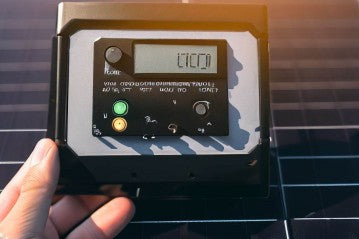
If you're interested in solar power, you've probably heard of 100W solar panels. These devices are compact, efficient, and can produce a significant amount of energy. But if you're planning on using a 100W solar panel, one of the most important questions you'll need to answer is: what size solar solar charge controller do you need?
In this blog post, we'll take a closer look at 100W solar panels and solar charge controllers, and help you determine the best size solar charge controller for your needs.
1. What Is a 100W Solar Panel and How Many Power Can It Produce?
A 100W solar panel is a type of photovoltaic panel that can convert sunlight into electricity. These panels are typically made up of silicon cells that absorb sunlight and convert it into a direct current (DC) electrical charge. From there, the electricity can be stored in a battery, used to power appliances directly, or fed back into the grid.
The amount of power a 100W solar panel can produce will depend on a variety of factors, including the amount of sunlight that the panel receives, the angle and orientation of the panel, and the efficiency of the panel itself. However, in ideal conditions, a 100W solar panel can produce up to 100 watts of power per hour.
2. What Size Solar Charge Controller for 100W Solar Panel?
A solar charge controller is an essential component of any solar power system. This device regulates the flow of electricity from the solar panel to the battery, ensuring that the battery is charged safely and efficiently. Without a solar charge controller, the battery could become overcharged, which could damage the battery and even create a fire hazard.
When it comes to choosing a solar charge controller for a 100W solar panel, there are a few factors to consider. The first is the voltage of the panel and the battery. Most 100W solar panels produce between 16 and 18 volts of electricity, which is typically enough to charge a 12-volt battery. However, some panels may produce higher voltages, so it's important to check the specifications of your panel before choosing a solar charge controller.
The second factor to consider is the amperage of the solar charge controller. The amperage rating of a solar charge controller refers to how much current it can handle. If the solar charge controller is not rated to handle the current produced by the solar panel, it may become overloaded, which could damage the controller or the battery.
As a general rule of thumb, you should choose a solar charge controller with an amperage rating that is equal to or slightly higher than the maximum output current of your solar panel. For example, if your 100W solar panel produces a maximum output current of 6 amps, you should choose a solar charge controller with an amperage rating of at least 6 amps.
Another factor to consider is the type of solar charge controller. There are two main types of solar charge controllers: PWM (pulse-width modulation) and MPPT (maximum power point tracking). PWM solar charge controllers are simpler and less expensive, but they are less efficient than MPPT controllers. MPPT controllers are more expensive, but they can increase the overall efficiency of your solar power system by up to 30%.
3. Conclusion
In conclusion, if you're using a 100W solar panel, it's important to choose the right size solar charge controller to ensure that your battery is charged safely and efficiently. When choosing a solar charge controller, you should consider the voltage and amperage of your solar panel, as well as the type of solar charge controller that will best meet your needs.
Ultimately, the size of the solar charge controller you need will depend on the specific specifications of your solar panel and battery, as well as your individual power needs. If you're unsure about which solar charge controller to choose, it's always a good idea to consult with a professional or to do additional research to ensure that you make the best choice for your unique situation.

0 comments